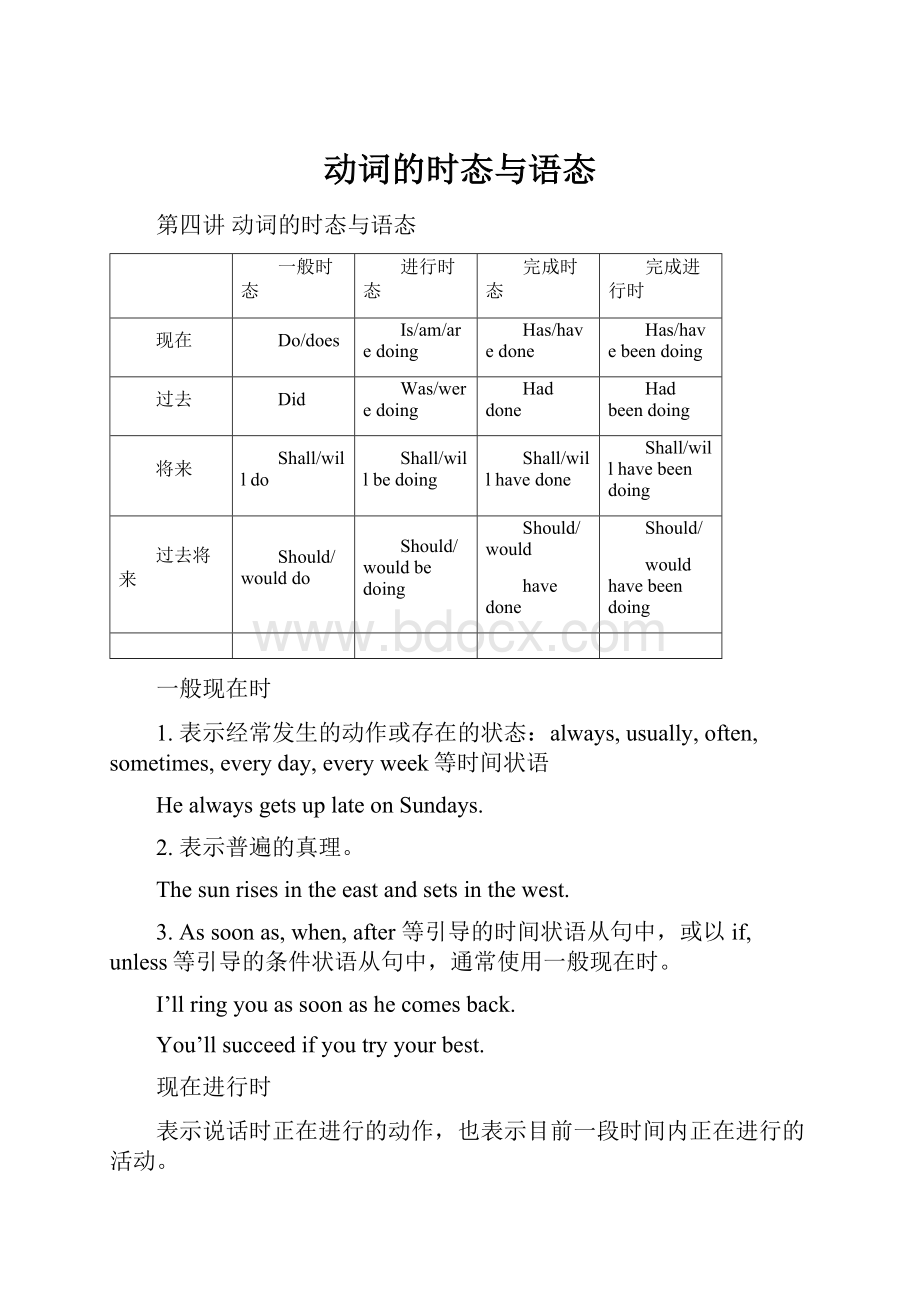动词的时态与语态.docx
《动词的时态与语态.docx》由会员分享,可在线阅读,更多相关《动词的时态与语态.docx(9页珍藏版)》请在冰豆网上搜索。

动词的时态与语态
第四讲动词的时态与语态
一般时态
进行时态
完成时态
完成进行时
现在
Do/does
Is/am/aredoing
Has/havedone
Has/havebeendoing
过去
Did
Was/weredoing
Haddone
Hadbeendoing
将来
Shall/willdo
Shall/willbedoing
Shall/willhavedone
Shall/willhavebeendoing
过去将来
Should/woulddo
Should/wouldbedoing
Should/would
havedone
Should/
wouldhavebeendoing
一般现在时
1.表示经常发生的动作或存在的状态:
always,usually,often,sometimes,everyday,everyweek等时间状语
HealwaysgetsuplateonSundays.
2.表示普遍的真理。
Thesunrisesintheeastandsetsinthewest.
3.Assoonas,when,after等引导的时间状语从句中,或以if,unless等引导的条件状语从句中,通常使用一般现在时。
I’llringyouassoonashecomesback.
You’llsucceedifyoutryyourbest.
现在进行时
表示说话时正在进行的动作,也表示目前一段时间内正在进行的活动。
1)并非所有动词都有进行时,表示状态和感觉的词通常没有进行态,除非词义发生变化。
Doyouseeanyoneoverthere?
Areyouseeingsomeoneoff?
2)现在进行时也可表示将来,指按计划要发生的动作或即将开始的动作。
I’mleavingforBeijingtomorrow.
3)现在进行时也可用来给习惯动作加上赞赏或讨厌的感情色彩。
Heisalwaysfindingfaultwithhisemployees.
现在完成时
表示目前已完成或刚刚完成的动作,也可表示从过去某一刻发生,现在仍延续的动作或情况。
此时态强调动作对现在的影响。
1)时间状语
Upto/tillnow,sofar,thesedays,thissummer,for...(一段时间),since…(时间点)
2)动作对现在是否有影响
IlivedinBeijinglastyear.
IhavelivedinBeijingfor15years.
过去进行时
过去某个时刻正在发生的动作,也可表示过去某段时间内正在发生或反复发生的动作
YesterdayafternoonIwaswatchingTVwhenFrankcalled.
Billwascoughingallnightlong.
过去完成时
表示过去某时之前已完成的动作或状况。
时间上为过去的过去。
句中常有明显的参照动作或表示“到过去某时为止”的时间状语。
Bytheendofthewar,thesmallworkshophadbecomealargefactory.
Theyfoundthatastreamhadformedinthefield.
一般将来时
表示某个将来时间会发生的动作或情况,也可表示将来反复发生的动作或习惯性动作。
Hewilltakepartinanimportantmeeting.
ThestudentswillhavefiveEnglishclassesperweekthisterm.
Begoingto,beto,beaboutto等也可表示将来的动作,用于表示打算、计划、安排和即将发生的动作。
Wearetofinishitwithinanhour.
Heisabouttoleave.
Will表示说话人认为、相信、希望或假定要发生的动作情况。
将来进行时
将来进行时表示将来某时正在发生的持续的动作。
I’llbehavingameetingthistimetomorrow.
Mostoftheyoungpeopleinthetownwillbemeetingthematthestation.
将来完成时
表示将来某时前已完成的动作,也可用来表推测。
Theywillhavestayedhereforfivemonthsnextweek.
Bytheendofnextmonth,theywillhavestudiedtwentypassages.
现在完成进行时
现在完成时表示已结束的动作或情况,强调对现在的影响。
现在完成进行时表示仍在进行或刚刚还在进行的动作或情况,强调动作的延续性。
Ihavethoughtitover.
Ihavebeenthinkingitover.
Becareful!
Peterhasbeenpaintingthebench.
Exercise
1.Evenifit___thisafternoon,Iwillgothere.
A.hasrainedB.willrainC.rainsD.willhaverained
2.___lastyearandisnowearninghislivingasanadvertisingagent.
A.HewouldleaveschoolB.Heleftschool
C.HehadleftschoolD.Hehasleftschool
3.We___eachotherfortenyears.
A.hadknownB.haveknown
C.havebeenknowingD.know
4.Theyfulfilledtheplanearlierthanthey___.
A.haveexpectedB.expected
C.wereexpectingD.hadexpected
Key:
CBBD
5.“Willshefinishtheworksoon?
”
“Yes,she___itbynextFriday.”
A.shallfinishB.finish
C.havefinishedD.willhavefinished
6.It___almosteverydaysofarthismonth.
A.israiningB.rainedC.rainsD.hasbeenraining
7.Mywife___.
A.hasforevercriticizedmeB.forevercriticizingme
C.wasforevercriticizingmeD.isforevercriticizingme
KeyDDD
被动语态
构成:
be+及物动词的过去分词
1)无须指出动作执行者或动作执行者不明确
PrintingwasintroducedintoEuropefromChina.
Romewasnotbuiltinaday.
2)强调动作承受者
Fourpeoplewerekilledandthirty-onewereinjuredinthebombattack.
3)修辞需要
Hestartedtocomplainaboutthiswickedworldbutwasinterruptedbyaknockatthedoor.
常见考点
1)相当于及物动词的短语动词也有被动语态,一般不拆开。
Thismatterwasdealtwithassoonaspossible.
2)不及物动词和表示状态的词无被动语态。
Happen,rise,occur,takeplace,breakout,
Lack,fit,suit,equal,become,resemble,befall,consistof,looklike
3)双宾语句主动改被动,只将一个宾语改为主语。
如直接宾语改做主语,间接宾语前加to。
Igavemyhusbandatie.
Myhusbandwasgivenatie.
Atiewasgiventomyhusband.
4)不定式符号to在被动语态中不可省略。
Isawherpassbythewindow.
Shewasseentopassbythewindow.
5)某些实义动词+副词也表被动意义。
Thistypeofrecordersellswell.
Thedoorwon’tshut.
Theshirtwasheseasily.
Nylondriesquickly.
6)某些词后跟主动形式的动名词可以表示被动意义,如worth,need,require,want(表需要)等。
Thefilmisquiteworthwatching.
Theclassroomissodirty.Itneedscleaning.
7)某些作表语的形容词后,用不定式主动形式表示被动意义。
Heishardtoplease.
Thearticleisdifficulttounderstand.
8)被动语态常用介词:
by表示动作的执行者或施动力,with表示用某种工具,of表示用某种原料制成(制成品可辨原料),from表示源于某种物质(制成品不可辨原料)。
Heisscoldedbyhisfather.
Theletteriswrittenwithapencil.
Thechairismadeofplastic.
Thechipsaremadefromsand.
9)非谓语动词被动语态构成
不定式tobedone/tohavebeendone
动名词beingdone/havingbeendone
Exercise
1.Theprofessorwasknowledgeableandeloquentand___withenthusiasm.
A.wasalwayslistenedB.wasalwayslistenedto
C.alwayswaslistenedD.alwayslistenedto
2.Hereturnedaweeklaterandfoundhishouse___.
A.hadbrokenintoB.wasbrokeninto
C.tobebrokenintoD.hadbeenbrokeninto
3.TheUnitedKingdom___GreatBritainandNorthernIreland.
A.consistedofB.isconsistedof
C.consistsofD.consist
KeyBDC
4.Theseoranges___nice.
A.aretastedB.tasteC.istastedD.tastes
5.In1950,shewasthelargestshipthat___.
A.waseverbuiltB.haseverbuilt
C.haseverbeenbuiltD.hadeverbeenbuilt
6.Thehousesuddenlycollapsedwhileit___down.
A.waspulledB.pulled
C.wasbeingpulledD.hadbeenpulled
7.“Howdoyoulikeyournewposition?
”“I___.”
A.don’tsatisfyB.amnotsatisfied
C.can’tsatisfyD.haven’tsatisfied
Keys:
BDCB
8.She___inthefeetonherwayhomefromwork.
A.washurtingB.ishurt
C.hurtsD.gothurt
9.Therearemorethanfiftyproposals___attheconference.
A.discussedB.tobediscussed
C.discussingD.havingdiscussed
10.ThoughNewtonwasagreatscientist,manyofhisideas___todayandarebeingmodifiedbytheworkoftoday’sscientists.
A.aretochallengeB.arechallenging
C.maybechallengedD.havebeenchallenged
Keys:
DBD
历年真题:
1.Forsometimenow,worldleadersoutthenecessityforagreementonarmsreduction.(2002)
A.hadbeenpointingB.havebeenpointing
C.werepointingD.pointed
2.AIDSissaidthenumber-onekillerofbothmenandwomenoverthepastfewyearsinthatregion.(2002)
A.beingB.tobeC.tohavebeenD.havingbeen
3.Jackfromhomefortwodaysnow,andIambeginningtoworryabuthissafety.(2003)
A.hasbeenmissingB.hasbeenmissed
C.hadbeenmissingD.wasmissed
4.Jameshasjustarrived,butIdidn’tknowheuntilyesterday.(2005)
A.willcomeB.wascomingC.hadbeencomingD.came
5.Thatwasnotthefirsttimeheus.Ithinkit’shightimewestrongactionsagainsthim.(2005)
A.betrayed;takeB.hadbetrayed;took
C.hasbetrayed;tookD.hasbetrayed;take
6.Thestudentsaidtherewereafewpointsintheessayheimpossibletocomprehend.(2006(55),2007(59))
A.hasfoundB.wasfindingC.hadfoundD.wouldfind
7.Thecommitteehasanticipatedtheproblemsthatintheroadconstructionproject.(2007)
A.ariseB.willariseC.aroseD.havearisen
答案:
BCABBCB
Missing的用法:
1.Lost:
失踪的:
amissingperson;soldiersmissinginaction.
一个失踪人员;在行动中失踪的战士
2.Lacking;wanting:
缺乏的;缺少的:
Thisbookhas12missingpages.
这本书缺了几页